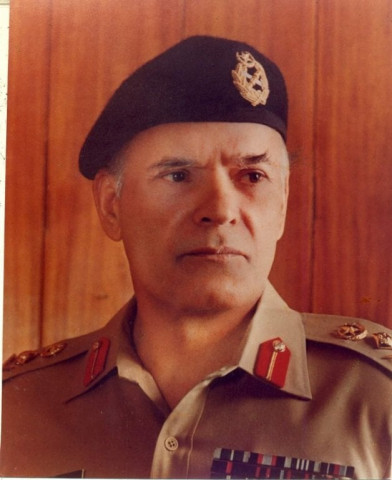Gen Akhtar Abdul Rahman: The unsung hero
Under his leadership, Pakistan’s ISI was made into one of the finest spy agencies in the world

General Akhtar Abdul Rahman, the architect of the Afghan war against the Soviet Union is one of the true heroes of this land, who led to the defeat of a superpower. He was a silent soldier who conceived the plan for the destruction of the Soviet Union. He showed passion, commitment, intelligence and the warrior’s spirit of great Islamic conquerors. Under his leadership, the intelligence agency of Pakistan was made into one of the finest spy agencies of the world. The ISI played an important role in the destruction of the Soviet Union. With his foresight, commitment and dedication, he increased the power and effectiveness of the ISI as an intelligence agency.
General Akhtar Abdul Rahman was amongst the finest Generals of the Pakistan Army. He was born on June 11, 1924 in Peshawar. His father, Dr Abdul Rahman died when he was four years old. He was raised and educated by his mother. He joined Government College Lahore and did his masters in economics in 1945. After completing his education, he joined the Army and was commissioned in 1947.
Akhtar was a junior officer at the time of the partition of India. He witnessed the unspeakable horrors of the partition and was dismayed by the brutalities committed by Hindus and Sikhs against Muslims. The traumatic events left a deep mark and were never forgotten nor forgiven by him. For the rest of his life he considered India as a dangerous enemy both for his country and religion. He fought in all three wars (1948, 1965, and 1971) with India.
Read more: Gen Akhtar Abdul Rahman, the man behind the Soviet defeat in Afghanistan
In 1979, General Akhtar was offered the important and coveted position of Director General Inter Services Intelligence. He headed the intelligence agency and built it into an effective institution impacting both national and international affairs. Within a span of eight years, along with his team of professionals, he gave new life to the ISI and made it into a vibrant and an effective institution.
In the wake of the Soviet invasion of Afghanistan there were apprehensions that they might attack Pakistan too. There were many potential threats to the security of Pakistan at the time. Gen Akhtar was alone in believing that he could force the Soviet forces out of Afghanistan. He was of the view that Pakistan should support the Jihad covertly. The military leadership under General Zia decided to fight with the Soviets much before the American support came. Initially, US President Jimmy Carter was entangled in his domestic problems which emerged after the hostage crisis in Iran, so negligible assistance was provided. American support for the war came when they realised victory may be achieved in Afghanistan through Pakistan. When Reagan came to the White House, he announced an aid package for Pakistan which Gen Zia accepted. Although covert operations by the ISI were funded by the CIA and Saudi Arabia, Pakistan became a frontline state. In making Afghanistan a “graveyard of superpowers”, General Akhtar played a central role and made the Soviet pull out inevitable. To come face to face with a superpower like Russia was a formidable task, but Gen Akhtar was determined to wipe them out and never looked back once he had made up his mind.
When Gen Akhtar took command of the ISI he had to start from scratch on the Afghan mission. He was solely responsible for devising and executing plans and organising massive covert military operations against the Soviets. He established training centres. Officials were made responsible to train the Afghan Mujahideen, equipping them with warfare strategies and the necessary skills that would enable them to defend their homeland against the Soviet invasion. Nine years of training, guidance and military assistance to guerrilla fighters in Afghanistan demolished the Soviets and claimed around 13000 Soviet lives. The world stood in awe as the less trained, less equipped and illiterate guerrilla fighters defeated the well-trained and heavily equipped Soviet Army.
Gen Akhtar was on the hit-list of KGB with a huge prize money put on his head, but he fearlessly moved forward in planning and executing the jihad. He was a born strategist. The way he articulated guerrilla warfare against a conventional army is unparalleled. He died in a fatal plane crash on August 17, 1988 near Bahawalpur and was never able to see the dawn of the Afghan Mujahideen victory and the fall of the Soviet Union.
What the ISI is today can be attributed to the efforts and commitment shown by General Akhtar Abdul Rahman. He very tactfully maneuvered the annihilation plan of the Soviet Union, thus demolishing communism. The role of Pakistan was acknowledged by the Germans when the ISI was presented with a piece of the Berlin Wall marked with the inscription “those who struck the first blow”.
The writer is a freelance columnist.













COMMENTS
Comments are moderated and generally will be posted if they are on-topic and not abusive.
For more information, please see our Comments FAQ